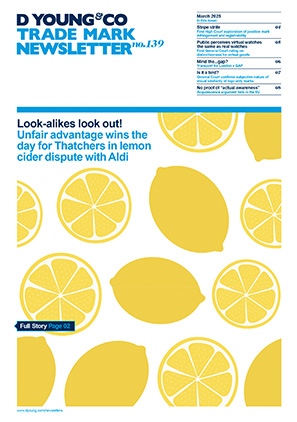Every Lidl helps? The saga continues at the Court of Appeal
Whilst succeeding in its appeal against copyright infringement, Tesco has failed to overturn first instance findings of trade mark infringement and passing off. Lidl’s appeal against the invalidity of its wordless logo marks was also dismissed.
Background
Lidl brought claims against Tesco on the basis that use of the latter’s Clubcard Prices sign constituted passing off and infringed Lidl’s trade marks and copyright.


In addition to disputing these claims Tesco counterclaimed for revocation of the wordless mark on the basis of non-use, as well as seeking a declaration for it to be declared invalid on the grounds of bad faith. Whilst this claim was initially struck out, the Court of Appeal later allowed the bad faith argument to proceed after finding that Tesco’s arguments did give rise to a real prospect of the presumption of good faith being overcome.
The High Court had found in favour of Lidl in relation to all of its claims, deeming that Tesco had infringed both the mark with text and copyright in Lidl’s works, and was also liable for passing off.
Additionally, Tesco’s counterclaim for a declaration of invalidity of the wordless mark succeeded because Lidl had been unable to sufficiently explain its intentions at the time of filing to rebut the claim of bad faith.
Passing off
Tesco’s main ground of appeal against the passing off decision concerned price-matching allegations brought by Lidl, and that the judge had been wrong to find that the average consumer, upon seeing the Clubcard Prices sign, would be led to believe that the price offered under it was price-matched with Lidl. Specifically, Tesco felt that the judge was wrong to conclude that the evidence presented supported a finding of deception.
Arnold LJ recognised that the initial decision may have been surprising given that no reference to either Lidl or price matching was made, and that Lidl’s own price-matching signs differed significantly from the Clubcard Prices sign. However, when considering that the wordless mark had become distinctive through use of the mark with text, he found that the Clubcard Prices sign would call the mark with text to mind. Since it was common ground that Lidl offered lower prices, this meant the average consumer would be led to believe that Tesco was price-matching. This appeal therefore failed.
Trade mark infringement
Tesco challenged the finding of unfair advantage, and claimed that the judge had been wrong to find that there had been a change in the economic behaviour of consumers. Both parties accepted that this issue aligned with the price-matching allegations brought by Lidl which, if made out, would be evidence of such a change. As Lidl was successful in establishing price matching this ground of appeal also failed.
Challenging the finding of detriment, Tesco again tried to argue that the judge had been wrong to find a change in the economic behaviour of consumers. However, Arnold LJ pointed out that the judge’s findings had been based on evidence showing that Tesco’s Clubcard Prices sign had been successful in slowing the switch of customers from Tesco to Lidl, and that Lidl had felt obliged to engage in corrective advertising promoting its lower prices compared to Clubcard prices.
These arguments, coupled with the successful price-matching allegations, were successful in overcoming Tesco’s appeals in relation to unfair advantage and detriment to Lidl’s mark with text.
In its final argument Tesco sought to argue against the finding that it had used its Clubcard Prices sign without due cause. Given that this sign was already found to have taken unfair advantage of the mark with text, this argument was quickly rejected by Arnold LJ.
Therefore, all appeals against the finding of trade mark infringement failed.
Copyright infringement
Tesco’s appeal against the finding of copyright infringement was based on two arguments:
- That Lidl’s works were not original, and that the judge had been wrong to find that placing a yellow circle inside a blue square involved free and creative choices.
- Failing this, Tesco argued that the Clubcard Prices sign didn’t reproduce substantial parts of Lidl’s works.
Disagreeing with Tesco’s first argument Arnold LJ found that, although the degree of creativity involved was minimal, the precise shades of blue and yellow and the precise positioning and dimensions of the circle within the square satisfied the test of originality. However, the scope of copyright protection afforded was consequently very narrow. By using slightly different shape dimensions and shades of blue and yellow Tesco did not infringe Lidl’s works. This appeal succeeded.
Invalidation
The final appeal was brought by Lidl against the finding that its wordless mark had been registered in bad faith and consequently invalidated.
In total, there were twelve grounds relied on at appeal, which Arnold LJ felt was indicative of Lidl’s inability to recognise any serious flaws with the judge’s reasoning in the first instance.
Arnold LJ reiterated the finding that the presumption of good faith had been rebutted due to an absence of evidence that Lidl intended to use the wordless mark in the form it was registered. It was therefore up to Lidl to explain its intentions which it was unable to do. Hence, Lidl’s registration and subsequent re-registrations of the wordless mark were deemed to have been for use as a legal weapon and its appeal failed.
In short
Ultimately, this was a highly fact-specific case from which it is difficult to draw any major conclusions. This is further reinforced by Birss and Lewison LJ’s commenting on the difficulties they had in this case which lay “at the outer boundaries of trade mark protection and passing off”.
Nonetheless, a key takeaway for brand owners comes from comments made by Arnold LJ about the usefulness of evidence tracking consumer behaviour in supporting claims of trade mark infringement. This can have a meaningful effect on a judge’s reasoning, and a party faced with such evidence should carefully consider the extent to which rebuttal evidence should be filed.
Case details at a glance
Jurisdiction: England & Wales
Decision level: Court of Appeal
Parties: Lidl Great Britain Ltd and Lidl Stiftung & Co KG v Tesco Stores Limited and Tesco PLC
Citation: [2024] EWCA Civ 262
Date: 19 March 2024
